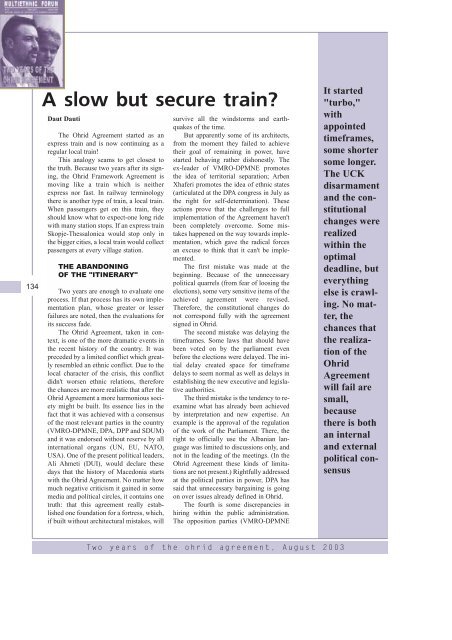Polyparty-ism - Search for Common Ground
Polyparty-ism - Search for Common Ground
Polyparty-ism - Search for Common Ground
You also want an ePaper? Increase the reach of your titles
YUMPU automatically turns print PDFs into web optimized ePapers that Google loves.
134<br />
A slow but secure train?<br />
Daut Dauti<br />
The Ohrid Agreement started as an<br />
express train and is now continuing as a<br />
regular local train!<br />
This analogy seams to get closest to<br />
the truth. Because two years after its signing,<br />
the Ohrid Framework Agreement is<br />
moving like a train which is neither<br />
express nor fast. In railway terminology<br />
there is another type of train, a local train.<br />
When passengers get on this train, they<br />
should know what to expect-one long ride<br />
with many station stops. If an express train<br />
Skopje-Thessalonica would stop only in<br />
the bigger cities, a local train would collect<br />
passengers at every village station.<br />
THE ABANDONING<br />
OF THE "ITINERARY"<br />
Two years are enough to evaluate one<br />
process. If that process has its own implementation<br />
plan, whose greater or lesser<br />
failures are noted, then the evaluations <strong>for</strong><br />
its success fade.<br />
The Ohrid Agreement, taken in context,<br />
is one of the more dramatic events in<br />
the recent history of the country. It was<br />
preceded by a limited conflict which greatly<br />
resembled an ethnic conflict. Due to the<br />
local character of the crisis, this conflict<br />
didn't worsen ethnic relations, there<strong>for</strong>e<br />
the chances are more realistic that after the<br />
Ohrid Agreement a more harmonious society<br />
might be built. Its essence lies in the<br />
fact that it was achieved with a consensus<br />
of the most relevant parties in the country<br />
(VMRO-DPMNE, DPA, DPP and SDUM)<br />
and it was endorsed without reserve by all<br />
international organs (UN, EU, NATO,<br />
USA). One of the present political leaders,<br />
Ali Ahmeti (DUI), would declare these<br />
days that the history of Macedonia starts<br />
with the Ohrid Agreement. No matter how<br />
much negative critic<strong>ism</strong> it gained in some<br />
media and political circles, it contains one<br />
truth: that this agreement really established<br />
one foundation <strong>for</strong> a <strong>for</strong>tress, which,<br />
if built without architectural mistakes, will<br />
survive all the windstorms and earthquakes<br />
of the time.<br />
But apparently some of its architects,<br />
from the moment they failed to achieve<br />
their goal of remaining in power, have<br />
started behaving rather dishonestly. The<br />
ex-leader of VMRO-DPMNE promotes<br />
the idea of territorial separation; Arben<br />
Xhaferi promotes the idea of ethnic states<br />
(articulated at the DPA congress in July as<br />
the right <strong>for</strong> self-determination). These<br />
actions prove that the challenges to full<br />
implementation of the Agreement haven't<br />
been completely overcome. Some mistakes<br />
happened on the way towards implementation,<br />
which gave the radical <strong>for</strong>ces<br />
an excuse to think that it can't be implemented.<br />
The first mistake was made at the<br />
beginning. Because of the unnecessary<br />
political quarrels (from fear of loosing the<br />
elections), some very sensitive items of the<br />
achieved agreement were revised.<br />
There<strong>for</strong>e, the constitutional changes do<br />
not correspond fully with the agreement<br />
signed in Ohrid.<br />
The second mistake was delaying the<br />
timeframes. Some laws that should have<br />
been voted on by the parliament even<br />
be<strong>for</strong>e the elections were delayed. The initial<br />
delay created space <strong>for</strong> timeframe<br />
delays to seem normal as well as delays in<br />
establishing the new executive and legislative<br />
authorities.<br />
The third mistake is the tendency to reexamine<br />
what has already been achieved<br />
by interpretation and new expertise. An<br />
example is the approval of the regulation<br />
of the work of the Parliament. There, the<br />
right to officially use the Albanian language<br />
was limited to discussions only, and<br />
not in the leading of the meetings. (In the<br />
Ohrid Agreement these kinds of limitations<br />
are not present.) Rightfully addressed<br />
at the political parties in power, DPA has<br />
said that unnecessary bargaining is going<br />
on over issues already defined in Ohrid.<br />
The fourth is some discrepancies in<br />
hiring within the public administration.<br />
The opposition parties (VMRO-DPMNE<br />
It started<br />
"turbo,"<br />
with<br />
appointed<br />
timeframes,<br />
some shorter<br />
some longer.<br />
The UCK<br />
disarmament<br />
and the constitutional<br />
changes were<br />
realized<br />
within the<br />
optimal<br />
deadline, but<br />
everything<br />
else is crawling.<br />
No matter,<br />
the<br />
chances that<br />
the realization<br />
of the<br />
Ohrid<br />
Agreement<br />
will fail are<br />
small,<br />
because<br />
there is both<br />
an internal<br />
and external<br />
political consensus<br />
Two years of the ohrid agreement, August 2003

















